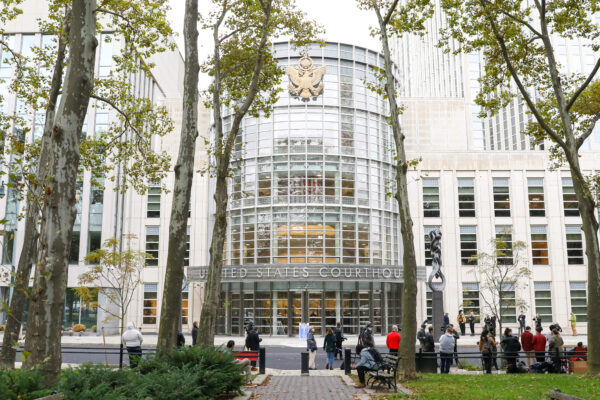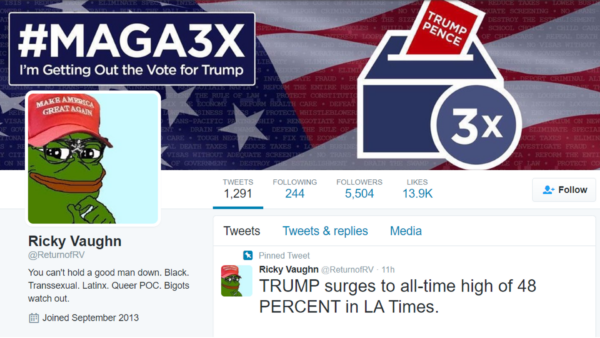A man who posted memes about the Hillary Clinton campaign during the 2016 presidential election was found guilty of one charge of conspiring against the right to vote on Friday.
“Douglass Mackey, also known as ‘Ricky Vaughn,’ was convicted today by a federal jury in Brooklyn of the charge of Conspiracy Against Rights stemming from his scheme to deprive individuals of their constitutional right to vote,” reads a statement released by the Eastern District of New York on Friday.
Members of the jury reached the unanimous verdict after a little less than a week of deliberation starting Monday afternoon after a weeklong period of arguments.
Mackey’s online persona, “Ricky Vaughn”—a reference to the sports comedy film “Major League”—had an online following of over 50,000 during the 2016 presidential election that frequently amplified his pro-Republican voice during the 2016 elections.
Mackey was on trial for a charge of allegedly conspiring against people’s right to vote with memes—or generally satirical online images—including one depicting an African American woman standing in front of an “African Americans for Hillary” sign. The meme instructed people to vote by text during the 2016 presidential election.
While the DOJ has prosecuted many other forms of election interference—such as violence, for example—Mackey’s case is a historical first, in that alleged falsehoods are being argued as a form of election interference, Eugene Volokh, a professor at UCLA School of Law specializing in First Amendment Law, told The Epoch Times in an interview earlier in March.
Mackey will be sentenced on Aug. 16, 2023, and faces a maximum of 10 years in prison.
Conspiracy or Satire?
The Department of Justice (DOJ), based on that meme and records of online discussions between Mackey and his peers, charged Mackey with conspiring against the right to vote.
Authorities arrested Mackey in January 2021 on that allegation, and a grand jury indicted him within two weeks of his arrest.
According to the prosecutors’ evidence presented in court, Mackey’s Twitter posts included one that suggested limiting “black turnout,” a statement that prosecutors said supports the charge that Mackey intended to conspire to interfere with the election. On the witness stand, Mackey described it as an “exaggeration.”

But according to Mackey’s defense attorney, that meme and Mackey’s Twitter posts were obvious jokes and cannot be taken as a serious attempt at conspiring against the opposition to Mackey’s preferred political party.
“Why would someone share a meme that you would vote for POTUS … without disclosing your name … or proving that you are of voting age?” asked Frisch rhetorically, mere moments after the prosecution delivered their opening statements. Frisch said that Mackey’s memes would be satirical in the eyes of a reasonable person.
“That feeling when you haphazardly post a meme and it winds up on cable television,” Frisch quoted a message that Mackey sent to his peers, emphasizing the word “haphazardly.”
Although a material injury—in this case, people’s right to vote being taken away—is not required to establish the conspiracy charge, the government said during the trial that people’s votes were “vaporized” by Mackey’s “digital flyers.”
“On or about and before Election Day 2016, at least 4,900 unique telephone numbers texted ‘Hillary’ or some derivative to the 59925 text number, which had been used in multiple deceptive campaign images tweeted by Mackey and his co-conspirators,” reads the DOJ’s Friday statement.
Mackey’s defense lawyer said the 4,900 texts were sent after Mackey’s Twitter account was suspended and following media reports of Mackey’s memes. Frisch said that the 4,900 texts were sent because of media reports on Mackey’s memes rather than in response to Mackey’s memes.
Plans to Appeal
During the trial, testimony presented by the prosecutors showed that members of the Clinton campaign reported Mackey’s memes to upper-level campaign managers during the 2016 election cycle, but the managers dismissed their concerns. Prosecutors, when confronted by Frisch about this evidence, did not dispute the factual validity of this evidence but noted the Clinton campaign personnel’s evidence should not be considered as evidence for or against the conspiracy charge.
Frisch, on the other hand, said during the trial that this evidence shows that the government withheld exculpatory evidence, citing Brady v. Maryland, a 1963 case in which the Supreme Court held that prosecutors must make available exculpatory evidence to defense counsel. Frisch said that the government’s withholding of evidence irreparably damaged his opening statements at trial and requested that the court declare a mistrial.

The court declined Frisch’s request, with the judge commenting that the court should not declare a mistrial when less drastic measures are available, including re-examining the witnesses on the said evidence.
Frisch told The Epoch Times in a statement on Monday that Mackey plans to appeal the conviction.
“This case presents an unusual array of compelling appellate issues,” Frisch said in a statement. “The appellate court will have its choice of which issue on which to vacate the conviction. It may choose to do so on first amendment grounds, or on the government’s suppression of exculpatory information, or on the insufficiency of evidence of venue, among other issues.”
“I am optimistic that the conviction will be vacated.”
Relevant Questions
Professor Volokh outlined three legal contentions that may come up on appeal, the appeals court’s ruling on which, he said, may set precedents for online speech.
“One possible argument is that the First Amendment just gives you the right to lie about elections and about how you can vote in elections,” Volokh said. “You can imagine that the First Amendment generally protects even lies about the government—not about particular people, that will be defamation,” Volokh said in an interview with The Epoch Times on Friday. “At the same time, there’s some reason to think that if you want to lie about … where the election is going to be held, or when it’s going to be held, or indeed how to vote—lies about the mechanics of voting, maybe that could be constitutionally restricted.”
A second question that will arise on appeal, according to Volokh, is whether the federal statute regulating conspiracy against rights extends to statements about election mechanisms beyond the statute’s current interpretation, which bans election interference through violence or physical obstruction, or threats.
“Then it might end up being too broad,” the professor said. “It might end up covering interference by just making false allegations about what a ballot measure will do, which may, in fact, make it too broad—too much of a restriction on speech about campaigns.”
“The last thing that’s going to come up … is, in context, was this a lie? Or is this a joke?” He said. “I think a lot of people look at the poster and say, ‘Hahaha, this is obviously kind of just a joke,’ in the theory that who would be stupid enough to believe this? Because, of course, everybody knows that you can vote by text. So I take it that’s going to be part of the argument.”
James Lawrence, attorney for Mackey’s legal advocacy group, the Douglass Mackey Defense Fund, told The Epoch Times that the government is using an obscure law to prosecute Mackey, and the case may have a chilling effect on Americans’ freedom of speech.
“This is a law that was passed in the aftermath of the Civil War, designed to protect the rights of newly freed slaves in the post-civil war South to vote,” Lawrence told The Epoch Times in an interview earlier in March.
“If the government’s theory prevails in this case and ultimately the government is successful in prosecuting Douglass Mackey, the First Amendment right of all Americans are potentially implicated because, depending on the administration in power, the precedent can be used to chill or undermine the Constitutional Rights of anyone, if they have a political view that differs from those that are in power.”
The prosecution notably concerns the ability of Americans to use satire, which has been used throughout history to critique power, he said.
“In this case, power is using a very old statute in an attempt to chill satire. So, it matters.”
Beth Brelje contributed to this report.








